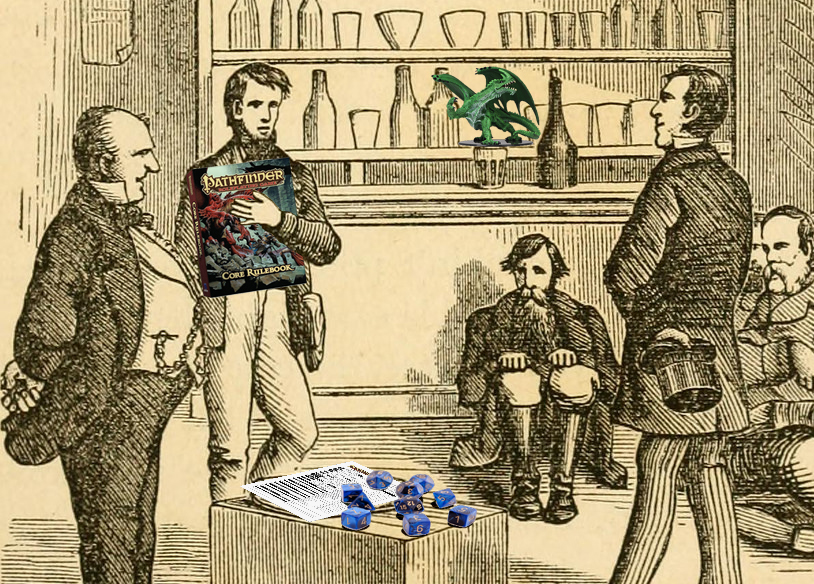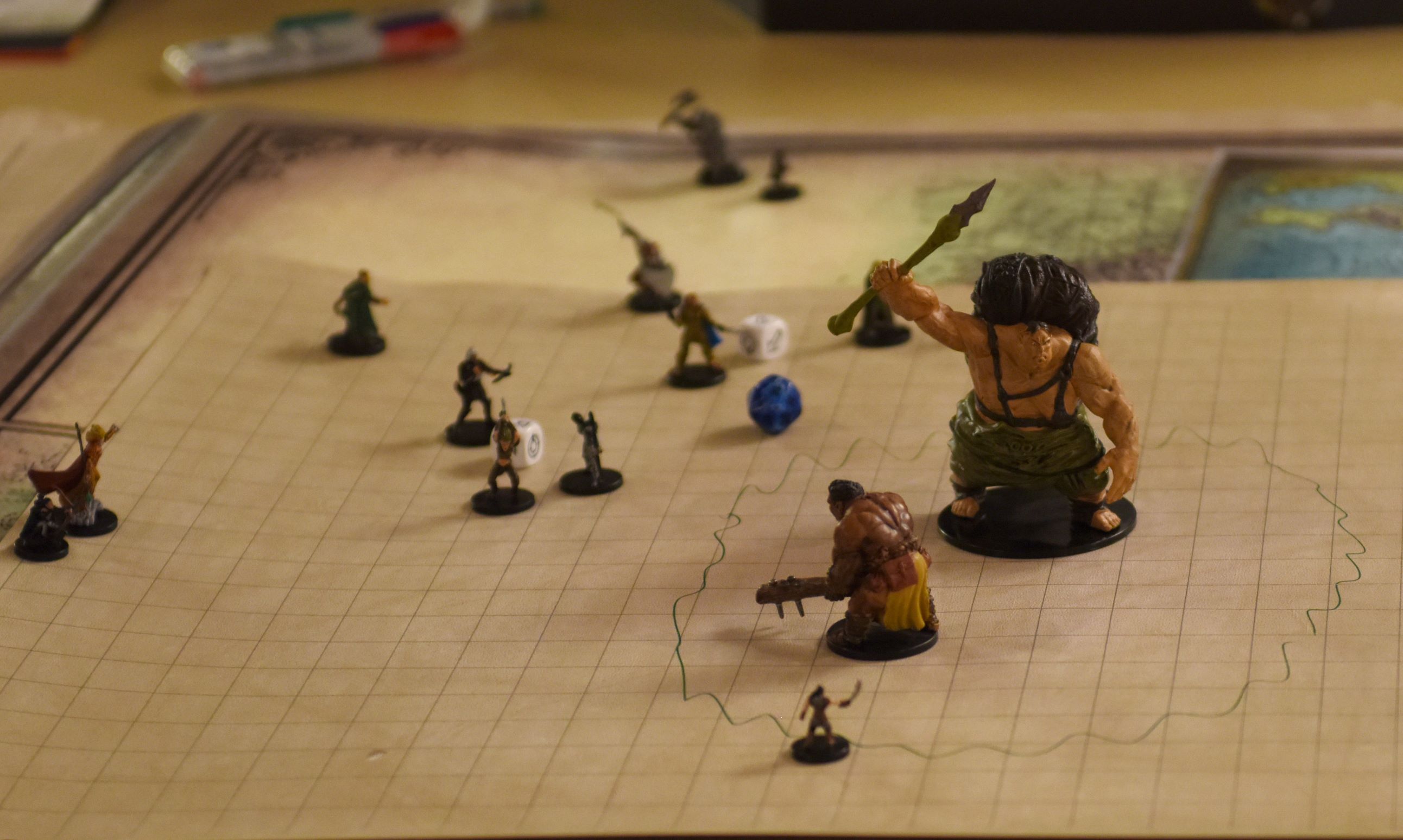Adapting to a new group isn’t always easy, and it can be especially tough when you’re a *cough* rules lawyer *cough*. Today we help a “knowledgeable” PFS GM integrate into a home game.
Dear DovahQueen: So I’m a new member of a group in an adventure path. They are very casual about the rules. I’ve been very active GMing PFS for the past 4 years, and I know the rules decently well. I don’t want to be the fussy rules lawyer, if they’re having fun then that’s great. But, I’m also having a hard time of not wanting to say something, especially since almost all of their rules interpretations are in favor of the player, and thus pretty much every encounter, combat or not, is a walk in the park. At the same time, they occasionally rib the GM for not making it harder, and a lot of times, they seem a little zoned out and not engaged. What’s the right play here?—Buford
Dear Beef Lord: So, I’m *awfully* prone to being a rules lawyer as well. What’s hard about it is that knowing the system so well is kind of a blessing and a curse. On one hand, having the core rulebook nearly memorized helps you arbitrate and run a smooth table when you’re the GM, and if your GM is trying to get all the rules right, you’re also able to help keep their game smooth as well. The problem is balance; how much lawyering is helpful and how much is getting on people’s nerves. Plus, that balance point is not the same with every group, and it can even shift in the same group depending on the session. Finding that balance in this group is where I think you’re going to get the most bang for your buck. Problem is, that balance is based on a few things: how much they wanna hear it and *how* they hear it.
You said you’re new to the group, yeah? That means that these people might be your buddies, but they’re prolly not the friends you’ve had for so long that you remember the crappy birthday presents they gave you, right? It’s a little cliché, but I think that simply getting to know the group better is a great place to start. In that light, try your hand lawyering just a little bit to see how they react. “To see how they react” is the key takeaway. I find that all of the worst rules lawyers think they’re being helpful because they fail to see how *not* appreciated their input is. Test the waters. See if their response is “Thanks, I wasn’t sure!” or “Ok.” Chances are if they’re being short or abrupt about it, they’re not appreciating it.
The getting-on-peoples-nerves aspect of rule lawyering is often more the result of delivery than of actual content. If you’re interjecting your knowledge with an “Umm, actually…” at the beginning, you’re really asking people to get annoyed with you. Folks tend to instantly harbor ill-will when they feel like they’re being “corrected” without having asked for it. This isn’t to say that helping the group better use the rules isn’t something you should try to do. Rather, consider the way in which you brooch the subject. Again, I’m quite capable of being really bad at this; I’m pretty OCD and things not being done the “right” way really rubs me the “wrong” way. When I see the system being mishandled, my immediate reaction is “Whoa, hey, I think this doesn’t work like that.” That’s an example of how to lose friends and get on folk’s nerves. Something that I’ve started doing which has worked well is just waiting to say something after the game if it’s still bothering me, and I try to say it in a way that isn’t targeted and all matter-of-fact. “Oh hey, I was doing this wrong the whole time. I thought we could X and Y, but the rules on page 137 really say you can only do X *or* Y.” In truth, you and I both know that we weren’t doing it wrong and that someone else was, but that’s not the point. The point is to impart the knowledge in such a way that it’s informative but not annoying. And again, pay attention to the reaction.
Lastly, I wanna ask if *you* really gotta be a rules lawyer to have fun with them? I mean, you can be; especially if it goes over well with the group. But really, what if it doesn’t? Would you be able to play with them despite their nonstandard use of the system? You’re coming from having spent a long time running PFS tables where things are ordered, structured, and downright lawful. Home games and non-Society games are a lawless wasteland where third party content and homebrew rules the day. It’s a whole different ballgame compared to chronicle sheets and guild guides. Normally, I would say that if this group is happy with the way they’ve been running things, then you maybe shouldn’t be working on their methodology. But you didn’t say that. You said that they’re losing interest, disengaging, and making light jokes about the difficulty. This is a whole different thing than rectifying rules issues, and it’s not one that you have total control over, but let’s talk briefly about what you can do anyway.
Be a good example for the other players. Coming from PFS, you’ve hosted a lot of PCs—some good, some less good. Write a killer character who’s as much fun to play with (and to GM for) as they are to play as.
Out of game, ask the GM if they’d like to hear some of your insights. You’ve done this a long time, and I honestly believe that every GM has something fantastic to teach about the way they run games. Folks who’ve been running tables for a long time often have accumulated quite a few teachings to impart. Candidly, politely, ask the GM if they’d be interested in some feedback. Remind them that they’ve seen their own players looking at their phones and you’ve got some ideas for that too.
Sidenote: I personally feel like just making a rule like “no phones at the table” is in poor form in most cases (but not all). If players are losing interest and looking at their cells, it’s not because they’re a bad and disrespectful person, it’s because their needs as a player aren’t being met. As a GM, I end every game asking each player to tell me two things: something you enjoyed about how the game was ran and something that could be improved about the same. Nobody enjoys arbitrary rules, and if someone’s not having fun, more rules aren’t going to suddenly make it more fun. There are exceptions to this, but I have digressed far enough.
While you’re ready to help them up their game, do so from a mindset that is also ready to listen and learn from them as well. Making a point to having a two-way conversation with someone is a good way to ensure that you’re talking to them respectfully. It’s also a good way to have what you’re saying respected in return.
There’s a lot here, so lemme try to summarize as best I can. Give yourself a break while you get to know these folks. Maybe hold back a little on the lawyering until you know how they’re gonna handle it, and do your best to read the room when you attempt it. Pay a lot of attention to *how* you lawyer, and word things in ways (and at times) that are least likely to get on people’s nerves or interrupt the game. Really take some time to figure out if you even *should* be lawyering. And then little, basic stuff like set a good example and offer feedback respectfully. Yeah, it’s a lot to think about, right? But if you’ve been running Society games for four years, I think you’re ultra ready to handle it. Good luck, but I’m 100% sure you won’t need it.
You can request RPG advice by sending an email to deardovahqueen@gmail.com or by message on Facebook.







